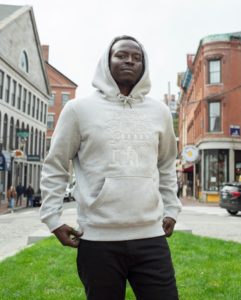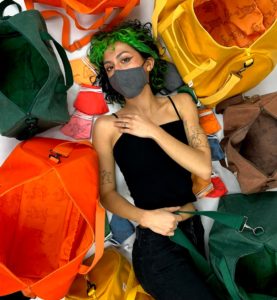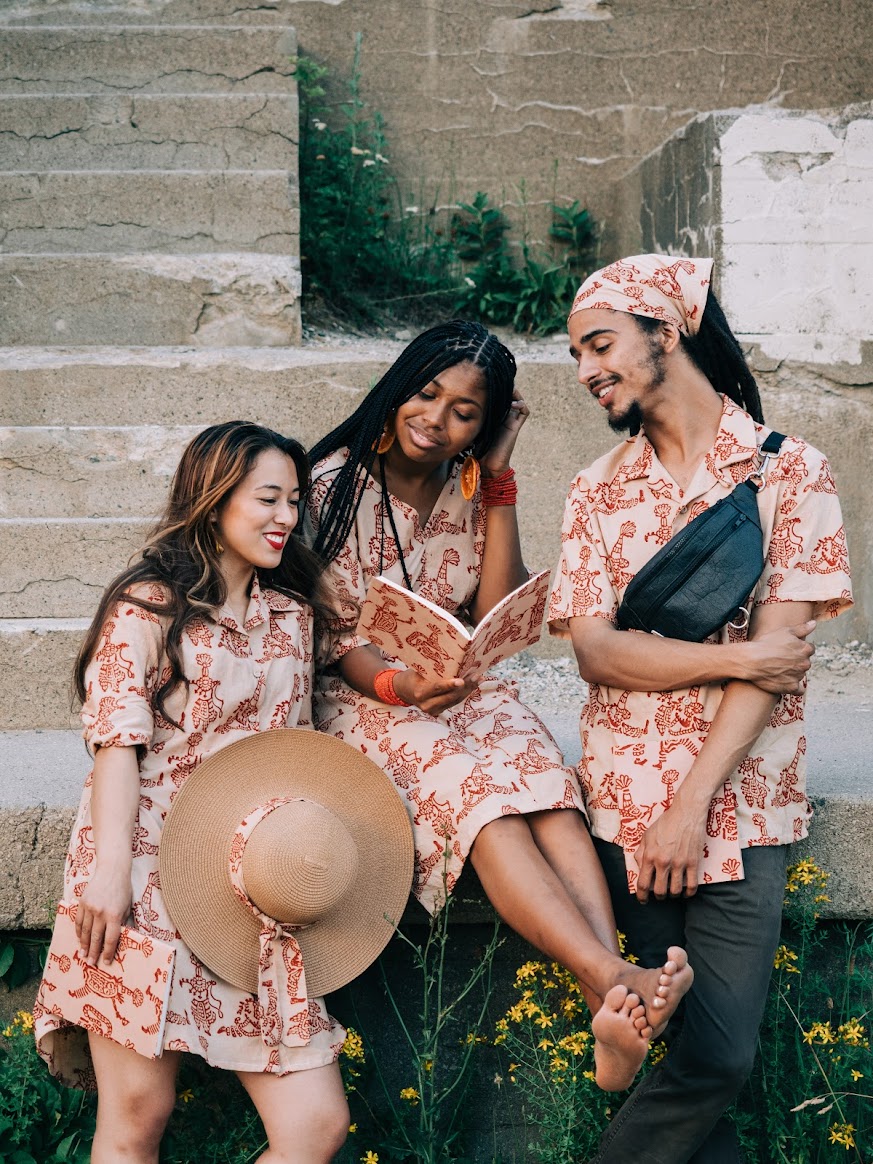By: Zoe Bernardi, Community Editor
The once “same hoodie everyday kinda guy” suddenly took a leap into the fashion world, but with a little bit more of a punch. Jordan Carey graduated in 2019 from Maine College of Art (MECA) with a BFA in Textile and Fashion Design. His senior thesis was the start of the Loquat Shop, which has now become his own business located in Portland. As described on their website, “Our materials, motifs, collaborations and contributions are selected to directly benefit and empower marginalized people, causes and aesthetics. Our goal as artists and designers is to honor the individuals, traditions and communities that have made LOQUAT possible.”
When Carey started school he was in the “fine art sector,” he explains that although he enjoyed creating 2D work and sculpture, the disconnect between his own family pushed him to explore more. Carey labeled “fine art” as a dated perspective, by definition fine art is “art developed primarily for aesthetics.” Most of these aesthetics are the class art that everyone imagines, the painting of the landscape, the sculpture of the women, a portrait of a man. Yet Carey wanted to do something different, inspired by home and away to uplift communities. Carey is an immigrant from Bermuda, went to school in Boston and then landed in Portland where he lives today and where the Loquat Shop headquarters are located.

He explains that the shift from his fine art world into fashion began when he noticed the disconnect between his artwork and his family’s reaction. He wanted to create artwork that was meaningful for his family and himself, that could inspire and was drawn from creativity. To dabble in a world with more relevant modes and mediums. He stated his family was inspired by cars and houses, their dance culture and the ephemeral ways life was so special. To immersify his own artwork with the muses around him.
His goals were to forge his once stagnant artwork into tangible and physical pieces. Carey’s shift started his freshman year and by the time he was a junior he was declared into the fashion department, where his thesis birthed the idea of the shop that is here today. He said, “how do we create more meaning within the mundane experience? How do we uplift the simple tasks of going for a walk to the local grocery store and getting a gallon of milk.” Carey and the Loquat Shop work to empower marginalized communities working with lifestyle curators to “make the boring, more inspiring through fashion and design.”
Carey is not alone in this process, his team is large and vast with his connections both in and around Maine. Some of his team members include Madison Poitrast-Upton who works directly with Carey, Jiwana Soleimani, and Meeta Mastani and her company Bindaas unltd.
“You can’t do it alone, that’s just a lie,” Carey said when explaining how much collaboration goes into his shop. “And that’s not even the design elements, I mean like all of the research, and drawing, and even the financials of bookkeeping and the business elements.” The Loquat Shop fuels the collaboration and unity of creating something together. It’s a team effort and the ways the Loquat Shops maintain their mission, “it’s a community effort, unless you want to do it alone, but that would take forever. I just have a great team.”

Carey and the Loquat Shop work with a lot of different artists, both small and large and use their shared resources to provide a platform within the Loquat community, “we work with the hobbyist up to the professional level, all while trying to stay in the realm of the ‘whole relationship.’”
A “whole relationship” is referring to the fact that someone must know them outside of the business world, to hold a friendship or know them on a personal level. That creates an environment where everyone knows each other and is able to work easily together when collaborating. Carey chuckles as he also mentions that “we are still at a place where I can also control what’s going on, but also I am picking who I work with.” He also explains that everyone involved gets a say in the project, it’s an entire team effort.
“But most of the time the creating happens over text, or napkin sketches, I can go out for drinks to talk about a project and be somewhere from 7 p.m. to 1 a.m. just chatting.” The design process is natural and flows between creators and the Loquat Shop to form the projects and pieces. Although the relationships come in plenty in Maine, as Carey has networks through MECA and friends he has here, he is not a Maine-only collaborator and has ties in other places. Such as Berumda where he and his family are, friends in Boston and elsewhere in the country. “We’ve only just started in southern Maine, as an immigrant it would be silly to say that we are only going to work with Maine artists.”
In order to maintain the growth of the business and the sustainability of collaborating, the Loquat Shop is starting local before taking bigger leaps nationally like Los Angeles, Atlanta and globally like the United Kingdom and Japan. After graduating from MECA, Carey said it made sense to stay in Portland rather than move to a new place where he had no relationships and fight for the spotlight, when he could stay where he knew people and showcase his unique project. Being in Portland supported the emotional and intelligence of the brand’s mission.

In the area of environmental sustainability Loquat Shop takes all of the obvious steps which include, no-spill dyes – meaning the ink used will not be dumped into the ocean, natural dyes and metal hardware, pineapple leather and no animal products or synthetic materials. All of the shipping is compostable and the cardboard boxes are biodegradable.
The glamor of the Loquat Shop stems from the art of storytelling. Giving the platform to unrepresented voices, “the romance comes from the relativity,” said Carey. The next step for Loquat Shop is a flagship store that hopefully will be on Exchange Street in Portland. Adorned possibly with a large red ribbon, a party might endure with the celebration of a physical location. “I also cannot wait to go back home to Bermuda,” Carey said. He misses his large family and wanting to return to see his people and be in his space.
As of right now the Loquat Shop is an online platform found at loquatshop.com and on instagram @loquatshop.

